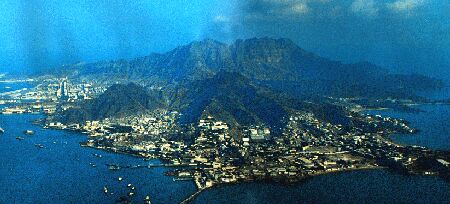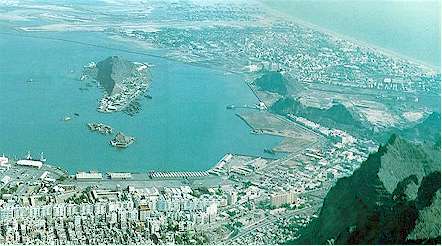
[This page is mirrored]
Aden, a historic glimpse:

Aden's history as an important South Arabian harbor reach back to
pre - Islamic and pre - Christian times. Old Testament
records mention the city as being a trade partner to Tyre a Phoenician port
on the Mediterranean Sea: "Arabia and all the princes of Kedar were your
favorite dealers ……… Haran, Canneh,
Eden
, Asshur
and Chilmad traded with you"
( Ez 27: 21 - 23 ). During the life of Ezekil
( early 6th century BC ), Aden was probably the main harbor of
Awsan the early south Arabian kingdom with center in Wadi Markha.
Aden's favorable location inside the dead crater of a volcano, protected
by a natural bay made it the ideal starting point for over - seas
journeys to India ( with the west east monsoon winds ) and to Africa.
Eritrea and Somalia could be reached in only a few days of sailing. The whole
African East Coast, including the islands of Pemba, Zanzibar and Mafia had
very early trade relations with the kingdom of Awsan through the harbor of
Aden. This explains the fact that part of the east African shore was called
the "Awsanian Coast" even long after the destruction of the Awsanian Kingdom.
The Kingdom of Awsan was conquered and totally destroyed by a Sabean invasion
at the end of the 5th century BC. However, Aden continued to flourish as
an important harbor, connecting Africa with the Gold and Incense Road of
Arabia. The unknown author ( probably 1st cent. AD ) of the
"Periplus MarisErythraei" who gives a detailed description of the Red Seaports
and part of the Arabian Coast east of Bab al - Mandab, remarks
on Aden: "Eudae mon Arabia ( Aden ), a settlement along the sea
shore, belonging to the kingdom of Caribael ( Karib Il Wadi ),
has favorable places for anchorage and fresh water supply. . . Freights are
coming from India and Egypt: diamonds, sapphires, ivory, cotton, indigo.
cardamom, pepper, dates, wine, myrrh, and frankincense"
Little is known about Aden during the early centuries of the Islamic history.
Historians report that, Ali al - Suleyhi added Aden and its hinterland
to his sphere of influence during the early years of the Suleyhi kingdom.
When Arwa Bint Ahmed was married to Ali's son al Mukarram, she received as
a dowry a yearly revenue from Aden, amounting to 100,000 gold dinars ( the
high amount sheds light on the prosperity of the port ). Aden was by
this time ruled by the Bani Zurrey. The rule of the Bani Zurrey ended in
1174 when the Ayyubites, arriving from Egypt conquered most of
Yemen.
When the Portuguese sailor Vasco da Gama discovered the route around the Cape of Good Hope in 1497 AD, he had opened a new chapter in the history of the Red Sea and the Indian Ocean. Only sixteen years later, another Portuguese captain Affonso d'Albuquerque had comprehended the strategic significance of Aden and tried to conquer it. But in vain. Aden was a well fortified city under the rule of the Bani Taher.
Alarmed by the presence of the Portuguese, the Egyptian Mamlukes occupied the Yemeni Tihama, but failed to conquer Aden like the Portuguese before. It was by treachery that Aden finally fell into the hands of Pasha al - Khadim, Commander of the fleet of Suleman the Magnificent in 153B AD. The same year marked the beginning of the first occupation of Yemen by the Ottoman Turks.
The first European to give a first hand description on Aden at the beginning of the 16th century, was the Italian Ludovico di Varthema. He writes: "Aden is such mighty and powerful that I have hardly seen another city of its might during my life. . . all big ships anchor at the port coming from India Ethiopia or Persia".
Aden's modern history begins with the occupation of the harbor by the British Captain Stafford Bettesworth Haines from the Indian Navy in 1839. Under Turkish Occupation and later under the rule of the Sultan of Lahej, Aden had declined to a small fishing village with only 1289 inhabitants. However, within a few years, the population increased again to some 20,000 inhabitants. Aden remained under British rule until 1967. It then became the capital of the People's Democratic Republic of Yemen in November 30, 1967 - Now, Aden is the commercial capital of The Republic of Yemen.
